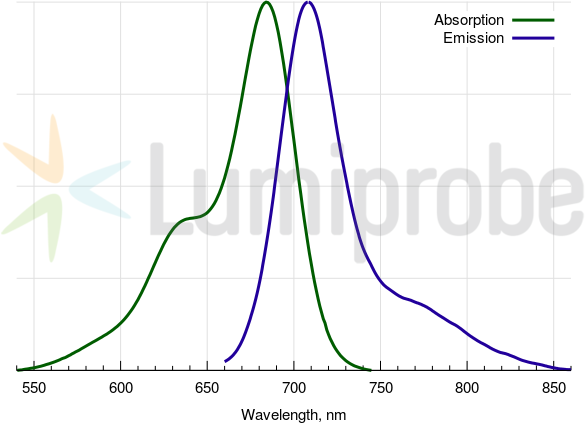Cyanine5.5 hydrazide
| Cat. # | Quantity | Price | Lead time | Buy this product |
|---|---|---|---|---|
| 17070 | 1 mg |
–
|
in stock | |
| 27070 | 5 mg |
$199
|
in stock | |
| 47070 | 25 mg |
$495
|
in stock | |
| 57070 | 50 mg |
$895
|
in stock | |
| 67070 | 100 mg |
$1490
|
in stock |

Cyanine5.5 hydrazide is a carbonyl-reactive near infrared dye. Hydrazides quickly react with carbonyl compounds, such as aldehydes and ketones, and form stable hydrazones. This reaction is useful for the preparation of labeled conjugates.
Carbonyl groups in biomolecules can form spontaneously after oxidative stress or deamination of proteins. Alternatively, aldehyde groups can be specifically generated by periodate oxidation of sugar residues of glycoproteins, for example antibodies. Antibodies can be oxidized by sodium periodate and labeled with Cyanine5.5 hydrazide to form Cyanine5.5 labeled antibodies. Since sugar residues in antibodies are located far from variable, epitope-binding site, this method is particularly good for the labeling of antibodies.
Cyanine5.5 is a near infrared fluorophore, an analog of Cy5.5®. It is particularly suitable for the applications which require low fluorescence background. The absorption and emission wavelength of the dye exhibit significant tissue penetration, so Cyanine5.5 is suitable for in vivo NIR imaging applications.
Cyanine5.5 absorbance and emission spectra

Customers also purchased with this product
BDP® 630/650 azide
BDP 630/650 is a bright borondipyrromethene-based fluorophore for the far red area of the spectrum. It possesses a high extinction coefficient and quantum yield. This is an azide for сlick chemistry labeling.FAM DBCO, 6-isomer
Cyclooctyne derivative of fluorescein (FAM) for copper-free click chemistry reaction with azides. Pure 6-isomer of fluorescein.YODi-3, red fluorescent nucleic acid stain
YODi-3 is a cell-impermeant red fluorescent nucleic acid stain. YODi-3 is chemically equivalent to YOYO®-3.General properties
| Appearance: | dark blue powder |
| Molecular weight: | 779.24 |
| Molecular formula: | C40H46N4ClPF6O |
| Solubility: | practically insoluble in water (< 2 uM), good in polar organic solvents (DMF, DMSO, alcohols) |
| Quality control: | NMR 1H, HPLC-MS (95%) |
| Storage conditions: | Storage: 24 months after receival at -20°C in the dark. Transportation: at room temperature for up to 3 weeks. Avoid prolonged exposure to light. Desiccate. |
| MSDS: | Download |
| Product specifications |
Spectral properties
| Excitation/absorption maximum, nm: | 684 |
| ε, L⋅mol−1⋅cm−1: | 198000 |
| Emission maximum, nm: | 710 |
| Fluorescence quantum yield: | 0.2 |
| CF260: | 0.07 |
| CF280: | 0.03 |
Product citations
- Fangue-Yapseu, G.Y.; Tola, A.J.; Missihoun, T.D. Proteome-wide analysis of hydrogen peroxide-induced protein carbonylation in Arabidopsis thaliana. Frontiers in Plant Science, 2022, 13, 1049681. doi: 10.3389/fpls.2022.1049681
- Machado, Y.; Duinkerken, S.; Hoepflinger, V.; Mayr, M.; Korotchenko, E.; Kurtaj, A.; Pablos, I.; Steiner, M.; Stoecklinger, A.; Lübbers, J.; Schmid, M.; Ritter, U.; Scheiblhofer, S.; Ablinger, M.; Wally, V.; Hochmann, S.; Raninger, A.M.; Strunk, D.; van Kooyk, Y.; Thalhamer, J.; Weiss, R. Synergistic effects of dendritic cell targeting and laser-microporation on enhancing epicutaneous skin vaccination efficacy. Journal of Controlled Release, 2017, 266, 87–99. doi: 10.1016/j.jconrel.2017.09.020
- Zhao, Y.; Wang, Y.; Ran, F.; Cui, Y.; Liu, C.; Zhao, Q.; Gao, Y.; Wang, D.; Wang, S. A comparison between sphere and rod nanoparticles regarding their in vivo biological behavior and pharmacokinetics. Scientific Reports, 2017, 7, 4131. doi: 10.1038/s41598-017-03834-2













 $
$ 
